Deborah J. Ross's Blog, page 65
June 11, 2019
New story up on Curious Fictions, one of my favorites. Re...
New story up on Curious Fictions, one of my favorites. Read the whole thing here.
Dragon's Beak and Wings of Bronze, or Something Unusual Happens to Allis

One summer afternoon, Lady Caroline hitched up her skirts, rolled two vinegar barrels into the corner of the cool, stone-floored herbarium and sat down for a private chat with her daughter, Allis. “You’re almost a woman, my dear, and it’s time you learned the family secret. The truth is, we’re were.”
Allis’s soft hazel eyes wandered to the hanging bundles of rosemary and feverfew. “Where?”
“Not ‘where.’ ‘Were’.” Lady Caroline sighed. Her sons were small and lean, as black-eyed and quick-tongued as she, while her only daughter . . .
“Were,” she repeated, speaking slowly so Allis could understand, “as in were-wolves. But not until your woman’s cycles come, and almost certainly not a wolf. I’m not, and neither is your aunt Jessie. Our family tradition has always been far more imaginative.”
Allis heard the sigh and the patience in her mother’s voice. Drifting on the patter of words, she guessed that something was going to happen to her, something that involved turning into an animal. Not a wolf, for she wasn’t nearly clever enough to be a wolf. Something slow and sleepy, like she felt right now. A lizard dozing in the sun? A turtle on a log?
Oh, dear. Suppose she became a were-turtle and nibbled on ants’ eggs? When she turned back into a girl, would the eggs still be inside her stomach?
Dragon's Beak and Wings of Bronze, or Something Unusual Happens to Allis

One summer afternoon, Lady Caroline hitched up her skirts, rolled two vinegar barrels into the corner of the cool, stone-floored herbarium and sat down for a private chat with her daughter, Allis. “You’re almost a woman, my dear, and it’s time you learned the family secret. The truth is, we’re were.”
Allis’s soft hazel eyes wandered to the hanging bundles of rosemary and feverfew. “Where?”
“Not ‘where.’ ‘Were’.” Lady Caroline sighed. Her sons were small and lean, as black-eyed and quick-tongued as she, while her only daughter . . .
“Were,” she repeated, speaking slowly so Allis could understand, “as in were-wolves. But not until your woman’s cycles come, and almost certainly not a wolf. I’m not, and neither is your aunt Jessie. Our family tradition has always been far more imaginative.”
Allis heard the sigh and the patience in her mother’s voice. Drifting on the patter of words, she guessed that something was going to happen to her, something that involved turning into an animal. Not a wolf, for she wasn’t nearly clever enough to be a wolf. Something slow and sleepy, like she felt right now. A lizard dozing in the sun? A turtle on a log?
Oh, dear. Suppose she became a were-turtle and nibbled on ants’ eggs? When she turned back into a girl, would the eggs still be inside her stomach?

Published on June 11, 2019 01:00
June 10, 2019
[Archives] Sexuality in Fantasy
 by Gustave CourtoisA version of this post appeared on my blog in 2012
by Gustave CourtoisA version of this post appeared on my blog in 2012A few years ago, I had the privilege of editing a new anthology series, Lace and Blade, from Norilana Books. The concept was a certain flavor of elegant, romantic sword and sorcery, witty and stylized, sensual yet with plenty of swashbuckling action (think The Scarlet Pimpernelwith magic). Because we wanted to release the first volume for Valentine’s Day, I contacted a group of seasoned professional authors, people I could depend on to understand what I was looking for and to deliver top quality stories to deadline. For various reasons, the publisher wanted the second volume to be open submissions. If I'd had any idea what I was getting myself into, I would have refused. Insulated in the world of competent fantasy writers and readers who are versed in the grandeur of writers from J.R.R. Tolkien to Tanith Lee, I was ill-prepared for what mundanes think of when they hear “fantasy.”
Needless to say, when I talk about sexuality or eroticism or sensuality or gender issues in fantasy, I do not mean pornography. It seems that for far too many people, sexuality is such an emotionally difficult subject that instead of facing it honestly, discussing it openly, they shroud it in prurience and embarrassment, or else turn it into something salacious or forbidden. Yet just about every human being over the age of puberty has had sexual feelings (notice my delicate use of qualifiers). So if sexuality in fantasy does not mean “your most lascivious and pornographic imaginings, regardless of whether you’d really like to do these things, because how would you know what you enjoy if you’ve never been permitted to experiment,” what is the role of sexuality in fantasy? Does it even have one? Should we keep sex out of fantasy literature, restrict the love stories to a chaste kiss now and again, and keep the hero/ine’s mind firmly fixed on nobler causes?
 by Salvador ViniegraI believe that sex is such a powerful force in human lives that it is impossible to portray the full scope of emotions and motivations without it. People might not, for a whole panoply of reasons, act on their sexual desires, but they have them. They have them in wildly inappropriate situations, as well as those times and places that nurture genuine emotional intimacy. The feelings are ignored or fulfilled, misdirected or frustrated, overly indulged or denied utterly. Freud had a few things to say about what happens when such a basic drive does not find healthy expression, and although his theories were dead wrong on many counts, he was not mistaken about the fact that sex will not go away simply because society (aka The Authorities, secular or clerical) disapprove. So already, we have two ways in which considerations of sexuality are important to any story: character development and world-building.
by Salvador ViniegraI believe that sex is such a powerful force in human lives that it is impossible to portray the full scope of emotions and motivations without it. People might not, for a whole panoply of reasons, act on their sexual desires, but they have them. They have them in wildly inappropriate situations, as well as those times and places that nurture genuine emotional intimacy. The feelings are ignored or fulfilled, misdirected or frustrated, overly indulged or denied utterly. Freud had a few things to say about what happens when such a basic drive does not find healthy expression, and although his theories were dead wrong on many counts, he was not mistaken about the fact that sex will not go away simply because society (aka The Authorities, secular or clerical) disapprove. So already, we have two ways in which considerations of sexuality are important to any story: character development and world-building.What are the attitudes and practices regarding sexuality in this culture? Is it permissive, repressive, or a combination? Is marriage live-long or fixed-term? Monogamous, polygamous, polyandrous? Do different cultures in your world treat love, sexuality, and marriage in the same way? (For example, how are sexual fidelity and jealousy regarded? Is marriage a personal or a business relationship? Who determines what is acceptable in sexual behavior? Have norms changed over time and if so, why? What are the social, moral or legal consequences of transgressions? Are there times, places, or partners for whom “anything goes”?
 by William BlakeWhere does a specific character naturally fall within the norms of his/her culture? How does he deal with the conflict between desire (or abhorrence) and expectation? Are other options (secrecy, emigration to a more compatible culture, open defiance) possible for him or her? Not all characters experience the same degree of sexual energy, and most will vary in their interest, depending on circumstances. Some will react to stress by becoming more sexual, while others will respond with diminished desire, even becoming asexual. Some interpret every personal interaction in sexual terms, and others are extremely private or compartmentalized. Interesting characters, like interesting cultures, are not monolithic in their sexuality.
by William BlakeWhere does a specific character naturally fall within the norms of his/her culture? How does he deal with the conflict between desire (or abhorrence) and expectation? Are other options (secrecy, emigration to a more compatible culture, open defiance) possible for him or her? Not all characters experience the same degree of sexual energy, and most will vary in their interest, depending on circumstances. Some will react to stress by becoming more sexual, while others will respond with diminished desire, even becoming asexual. Some interpret every personal interaction in sexual terms, and others are extremely private or compartmentalized. Interesting characters, like interesting cultures, are not monolithic in their sexuality.Sexuality has a special role in fantasy stories because of its universality (or near-universality) in human experience, and its power. It’s fairly common to use sexual energy as the basis for magic. In some systems, magicians create power by channeling the sexual energy either of themselves or of someone else, making sex a necessary part of magical use. But in other systems, sexual energy and magic are incompatible, leading to painful choices for characters and societies.

Published on June 10, 2019 01:00
Spring 2019 Newsletter
Spring 2019 Newsletter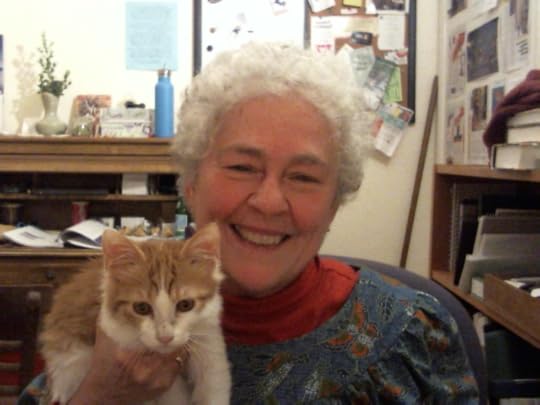 Spring 2019 NewsletterWe made it through the winter! My life has been abuzz with writing projects, convention appearances, and -- kittens! Read about The Great Ringworm Wars below.You'll also find the Introduction and Table of Contents from Ink Dance: Essays on the Writing Life, now available in a print edition with blank pages for personal notes, so you can use it as a workbook.Here’s what’s new:
Spring 2019 NewsletterWe made it through the winter! My life has been abuzz with writing projects, convention appearances, and -- kittens! Read about The Great Ringworm Wars below.You'll also find the Introduction and Table of Contents from Ink Dance: Essays on the Writing Life, now available in a print edition with blank pages for personal notes, so you can use it as a workbook.Here’s what’s new:
I sold a novelette to Sword and Sorceress 34. "Many Teeth" involves swordswomen, annoying mothers, and dinosaurs. My beloved spouse is already campaigning for a novel-length version.
I turned in The Laran Gambit to DAW last fall, but don’t have a release date yet. However, my editor has let me know the title will almost certainly change, so let’s call it a working title, a placeholder until inspiration strikes!
I'm hard at work on Arilinn, a Darkover novel to be published by DAW, about the founding of that prestigious Tower. For your reading pleasure, get 25% off my ebooks (mobi or epub) at Book View Cafe. On checkout, use this one-time coupon: Ross2019Coming in October 2019!
For your reading pleasure, get 25% off my ebooks (mobi or epub) at Book View Cafe. On checkout, use this one-time coupon: Ross2019Coming in October 2019!
A Heat Wave in the Hellers, and Other Tales of Darkover® a collection of my own Darkover short stories, some previously unpublished, including one that I wrote as a birthday gift for Marion. (At Book View Cafe, Amazon, Barnes and Noble, and other outlets, in print and ebook formats.)
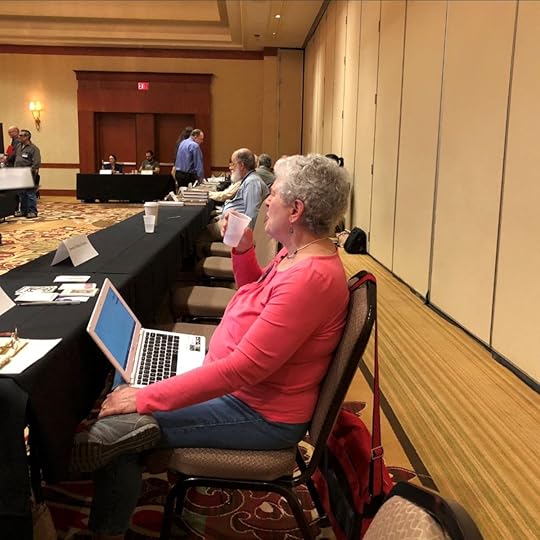 Upcoming eventsI just got back from the Nebula Award Weekend, hosted by the Science Fiction Writers of America. Here I am at the mass autographing at the Nebulas (that's Harry Turtledove in the background). Photo by Dave Smeds.
Upcoming eventsI just got back from the Nebula Award Weekend, hosted by the Science Fiction Writers of America. Here I am at the mass autographing at the Nebulas (that's Harry Turtledove in the background). Photo by Dave Smeds.
I will be a guest panelist at BayCon, San Mateo CA, over Memorial Day weekend. I hope you’ll stop by and say hello.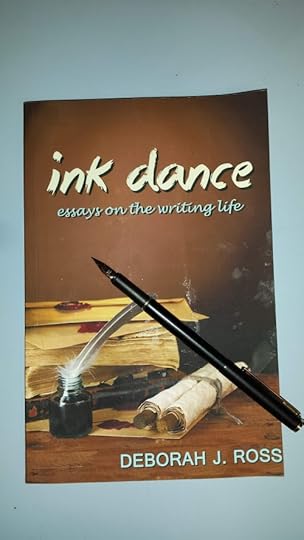
Ink Dance: Essays on the Writing Life A cup of inspiration, a dash of understanding, a bouquet of wisdom for writers new and old. From the desk of writer and editor Deborah J. Ross comes a collection of warm, insightful essays on “the writing life” – from getting started, negotiating with the Idea Fairy and creating memorable characters, to writing queries, surviving bad reviews, dealing with life’s interruptions and creative jealousy, to nourishing yourself and your creative muse. With space for personal notes.This collection of my blog posts over a number of years ranges in topic from writing craft to daily rhythms and self-care to staying motivated over the long haul of a career. A number of readers asked for a print version so they could jot down their own notes. It's available now from Amazon, Barnes & Noble, and your local bookstore through Ingram (ISBN 978-1-61138-757-5)
To whet your appetite, here's an excerpt from the introduction by Mary Rosenblum, and table of contents:
This collection of essays guides you through the craft and career of writing with all the useful information of a shelf full of ‘how to’ books, but offered with the warm personal energy of a conversation across the kitchen table.
From her advice on how to actually get started, her craft and career tips, to her really excellent counsel on how to survive writing in real life and still nourish yourself and your spirit, this collection offers an in depth look at what it means to be a writer. Every day. All the time.
While Deborah’s career has been New York oriented, most of what she has to say works for today’s author going the small press or Indie route as well. She speaks of the things that helped her succeed or got in her way with a refreshing personal honesty that invites us to examine our own behaviors. There’s a lot here for any aspiring writer who takes his or her craft seriously. No matter what you write or how you publish.
Read it, learn, and enjoy! You’ll come away nourished.
Table of Contents
Just You and a Blank Page
Getting Started in Writing
Negotiating with the Idea Fairy
Warm Ups
Open Here
More On Story Beginnings
Structure, Shape, and Interest
Do You Outline Your Novel? Should You?
Dream A Little Dream
It’s Only Fiction
Not Just Another Funny Forehead: Creating Alien Characters
Villains, Evil, and Otherness
Revenge and Retaliation
First Person Perils
Why Write Short?
Why Write Long?
Sexuality in Fiction
The Magic Notebook
Focus
Write It Again, Sam
More Thoughts on Revision
Critiquing Vs. Editing
Strategies for Dealing With Writer’s Block
Overcoming the Inertial Hump
Sam In Spades: Why Not to Revise
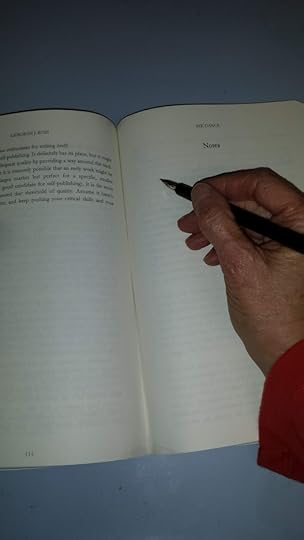
Career and Survival
Queries, Synopses, Pitches and Other Uneasy Friends
Pitches and Why I Should Care
Book Promotion Rehabilitation
Non Obnoxious Book Promotion, Part 2
Gate-Keeping in the World of Ebooks
Story And Self
Stages in a Writer’s Development
Blackberry Writing
When A Story Isn’t Ready
Series as Career Killer
How Gossip Can Trash Your Writing Career
Reviews: The Good, the Bad, and the Ignorable
Inner Voices
Surviving Dry Spells
The Magic Phone Call
Letting Go, Moving On
The Writer’s Life
Where Do You Write?
Writing Without Electricity
Interruptions
When Writing Friends Aren’t
Creative Jealousy
Encountering Wannabee Writers
The Lady (and Honorary) Writers Lunch
Mentoring
Exercise and the Older Writer
Listening
When Is It Enough?
Nourishing Yourself
Survival as a Writer (or Artist, or Musician)
Defining Writing Success as Publishing
Would You Write Anyway?
Zen Yoga Writing Practice
Nothing Creative is Ever Wasted
'Tis the Season To Get Crazy
Pacing
Community and Solitude
Cross-Training for Writers
On Writing and Healing
Writing Fears
Goals vs. Wishes
Settling In Meditation and WritingThe Great Ringworm Wars
It all started last December with an article in the local newspaper, saying that the animal shelter was overcrowded and were offering half-off on adoption fees. So, since mine beloved spouse had been languishing in the absence of a dog (a German Shepherd Dog, preferably of German working lines, to be precise), I went to the shelter’s website to take a look. Behold, there was a young female who looked great in her beauty shot. We called the shelter. She wasn’t at all workable for us, being super high-energy and not cat-safe. (GSDs have a high prey drive, so it takes a special individual dog – like one that’s been raised with cats and taught proper manners – to not regard them as Fun Things To Chase and Kill). While I was on the site, I noodled around the list of adoptable cats and saw a couple that reached out to my heart. I have a soft spot for tortoiseshells, and my long-time favorite cat was a dilute (gray) tortie.
Then up speaks Daughter Who Abides With Us, saying she has quietly harbored Kitten Lust since the Ragdoll kitty she brought with us died (FIP, Feline Infectious Peritonitis, invariably fatal). She went looking on the web for another Ragdoll or similar breed and found one. A family conference ensued, replete with “I had no idea you wanted a kitten so badly” and “I didn’t want to be a burden” sorts of statements. Further research led us to not one but two kittens:
Sarah (Daughter Who Abides With Us) located a Maine Coon mix, a gorgeous red and white girl at a local private shelter. Bright red, unusual in a female, with golden eyes. I felt a certain loyalty to the public shelter, especially since they had a sweet little dilute tortoiseshell tabby (“torbie”) with only one eye. We called the private shelter, passed their application procedure with flying colors, and reserved her. Then we decamped to the public shelter to look at Pirate Girl.
(Note: we already have one one-eyed cat. Gayatri came to us from the same public shelter about a decade ago. From the damage to her eye and her extremely hand-shy behavior, we deduced it was traumatic.)
Pirate Girl (aka “Cornelia,” now Freya, Odin’s wife) was timid at first but began to warm up to us quickly. Given everything she’d been through in her short life – her intake photo with a hugely swollen lesion on her eye, covered in fleas, with a cold and parasites, was truly pathetic – it was no wonder. We brought her home but isolated her in my office to give her time to adjust and get used to being in a house instead of a cage. After a week, she was making love to us, purring like mad, gobbling up the kitten food we provided, and trying to make a break for it whenever we opened the door. So we tried her in the general household, taking it step by step. (First put adult cats in bedrooms, let kitten roam free and smell where they’d been; reverse procedure; put kitten in dog crate with adults loose, observe them for hissing and other bad words; introduce under close supervision.) It turns out that Shakir, our male, about 10 years old, fancies himself a patient, indulgent grandfather to kittens. Before long, he and Freya were romping and curling up together. Gayatri (the Original Pirate Queen), not so much, but as she mostly hang out in Sarah’s room, the hissing was manageable.
Then came time to bring “Hallie” (now Red Sonja, guess why) home. Poor girl, she was found abandoned and turned into a different public shelter at only one month old, and was set to be euthanized the same day. Fortunately, one of their staff called the private shelter and they rescued her.
I bet you’re wondering where the ringworm comes in. Guess? Sonja been handled a bunch in the private shelter so she was much more outgoing, but they did tell us she’d had ringworm and had been treated. We left Freya in the living area, put Sonja in the office, and then took her to our vet.
Eeek! Hairs glowing under Wood’s light!
Yes, indeed, ringworm had come to live at our house.
[Note: Ringworm has nothing to do with worms. It’s a fungal infection -- aka dermatophytosis or tinea – of skin and hair. It’s highly contagious, especially in young critters like puppies or kittens or toddlers, whose immune systems aren’t fully in gear. In humans, the lesions spread out in a characteristic ring shape, hence the name. The fungus produces infective spores that can remain, inert but just waiting, in the environment a considerable period of time. The usual mode of transmission is by direct contact with an infected animal.]
There followed a protracted discussion with our vet, her consulting veterinary dermatologist, and the owner of the private shelter. Could the hairs that fluoresced be old, inactive infections? Could she still be infective? What treatment had she received and how long ago? (Answer: more stinky, dehydrating lime sulfur dips and oral meds than you would ever want to put a kitten through.) Could she have been cured and then re-infected?
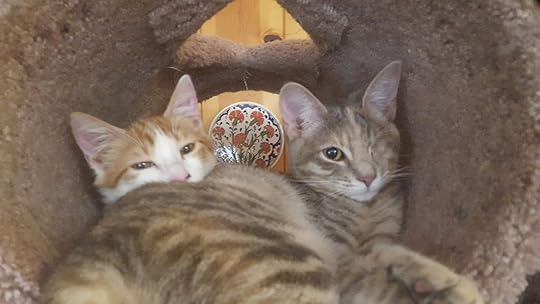
After a while (vets take vacations and poor Sonja was tearing apart my office out of boredom and the sure feline knowledge that there were cats out there somewhere and she wanted to play now), we decided the risk was small so we’d introduce her to the others. As before, Shakir was a gentleman, although one early encounter consisted of Sonja throwing herself on her back in front of him, screaming, and him looking utterly perplexed because he hadn’t touched her or growled or hissed, he’d only looked.
But it was the wrong call. You knew that, didn’t you? We found out when Sarah developed a spot of ringworm. Then another. Then I did. So yes, the kittens were infective.
Picture a mad scramble to take three cats to the vet. Gayatri really hadn’t had any direct contact, so we left her for last. Shakir was fine, but poor Freya had caught it. Back into isolation for both kittens, this time with a treatment plan:Shampooing (to kill the spores in the coat) two or three times a week with fungicidal stuff that has to be left on for 10 minutes while the kitten, wrapped in a towel, shivers and complains;Oral fungicide (to kill the fungus in the hair shaft) daily;Topical fungicide twice a day to the lesions we knew about;Daily vacuuming and every couple of days changing bedding and wiping down hard surfaces with disinfectant and/or dilute bleach.Wearing a smock or sweatshirt when in the room, washing hands after touching the kittens, using prescription antifungal cream.Recheck in 2 weeks.Sarah and I developed a shampoo routine, involving preparing 4 towels, timer, and so forth. I held each kitten while she shampooed and rinsed. She’s amazingly patient and gentle. The whole process took about an hour.
Two weeks later, Freya had exchanged one set of spots for another, and Sonja had new lesions. This was one tough fungus. Were we sure that everything in the office had been cleaned? It was time to up our game.Shampooing every other day, followed by a dilute bleach dip that gets left on to dry;Oral fungicide daily;Topical twice a day;Continue daily vacuuming plus electrostatic dry mop (Swiffer) plus washing floors every couple of days;Continue changing bedding, washing or bleaching toys;Continue wearing a smock or sweatshirt when in the room, washing hands after touching the kittens, using prescription antifungal cream.Recheck in 2 weeks.By this time, the kittens knew What Was Up on shampoo days. Their poor coats were all dry and rough from the bleach dip. It’s a credit to their sweet natures that neither ever tried to bite, considering all the awful things we were doing to them. Mine beloved spouse helped out with the vacuuming.
Next recheck, we were almost out of the woods. Both kittens were fluorescence-free. But as the vet said, if this were any other case we’d be done, but this is one hella resistant strain. So they were still in isolation, although we (Hallelujah!) stopped the baths and dips, went to once daily topical on the last places there were spots, and vacuuming as before. The theory is that by the gold standard, fungal culture, Sonja was clear when she left the private shelter, so we might get a clear culture anyway. If there’s still a small infection, it should flare up when we stop the shampoo/dip, so that’s our experiment.
They were still clear in two weeks, but another chapter began: one of our adult cats, Gayatri, showed suspicious patches of hair loss under her collar where we hadn’t seen it before. Yep. Same deal, only she totally freaked out at being bathed. She’s 12 and is entitled. We did the oral meds plus topical liquid plus dilute bleach dips twice a week. It worked like a charm
We were in the clear! The next challenge was introducing everyone. The kittens had thoroughly bonded to one another, so they romped gleefully through the house, leaving the seniors in peace. Nevertheless, rapprochement accompanied the inevitable hissing, and before long, Shakir was playing and cuddling with “the kids.”
I have to put this in a story. . .


 Copyright © 2019 Deborah J. Ross All rights reserved.
Copyright © 2019 Deborah J. Ross All rights reserved.
My mailing address is:
PO Box 1412, Boulder Creek CA 95006
Want to change how you receive these emails?
You can update your preferences or unsubscribe from this list.


 Spring 2019 NewsletterWe made it through the winter! My life has been abuzz with writing projects, convention appearances, and -- kittens! Read about The Great Ringworm Wars below.You'll also find the Introduction and Table of Contents from Ink Dance: Essays on the Writing Life, now available in a print edition with blank pages for personal notes, so you can use it as a workbook.Here’s what’s new:
Spring 2019 NewsletterWe made it through the winter! My life has been abuzz with writing projects, convention appearances, and -- kittens! Read about The Great Ringworm Wars below.You'll also find the Introduction and Table of Contents from Ink Dance: Essays on the Writing Life, now available in a print edition with blank pages for personal notes, so you can use it as a workbook.Here’s what’s new:I sold a novelette to Sword and Sorceress 34. "Many Teeth" involves swordswomen, annoying mothers, and dinosaurs. My beloved spouse is already campaigning for a novel-length version.
I turned in The Laran Gambit to DAW last fall, but don’t have a release date yet. However, my editor has let me know the title will almost certainly change, so let’s call it a working title, a placeholder until inspiration strikes!
I'm hard at work on Arilinn, a Darkover novel to be published by DAW, about the founding of that prestigious Tower.
 For your reading pleasure, get 25% off my ebooks (mobi or epub) at Book View Cafe. On checkout, use this one-time coupon: Ross2019Coming in October 2019!
For your reading pleasure, get 25% off my ebooks (mobi or epub) at Book View Cafe. On checkout, use this one-time coupon: Ross2019Coming in October 2019!A Heat Wave in the Hellers, and Other Tales of Darkover® a collection of my own Darkover short stories, some previously unpublished, including one that I wrote as a birthday gift for Marion. (At Book View Cafe, Amazon, Barnes and Noble, and other outlets, in print and ebook formats.)
 Upcoming eventsI just got back from the Nebula Award Weekend, hosted by the Science Fiction Writers of America. Here I am at the mass autographing at the Nebulas (that's Harry Turtledove in the background). Photo by Dave Smeds.
Upcoming eventsI just got back from the Nebula Award Weekend, hosted by the Science Fiction Writers of America. Here I am at the mass autographing at the Nebulas (that's Harry Turtledove in the background). Photo by Dave Smeds.I will be a guest panelist at BayCon, San Mateo CA, over Memorial Day weekend. I hope you’ll stop by and say hello.

Ink Dance: Essays on the Writing Life A cup of inspiration, a dash of understanding, a bouquet of wisdom for writers new and old. From the desk of writer and editor Deborah J. Ross comes a collection of warm, insightful essays on “the writing life” – from getting started, negotiating with the Idea Fairy and creating memorable characters, to writing queries, surviving bad reviews, dealing with life’s interruptions and creative jealousy, to nourishing yourself and your creative muse. With space for personal notes.This collection of my blog posts over a number of years ranges in topic from writing craft to daily rhythms and self-care to staying motivated over the long haul of a career. A number of readers asked for a print version so they could jot down their own notes. It's available now from Amazon, Barnes & Noble, and your local bookstore through Ingram (ISBN 978-1-61138-757-5)
To whet your appetite, here's an excerpt from the introduction by Mary Rosenblum, and table of contents:
This collection of essays guides you through the craft and career of writing with all the useful information of a shelf full of ‘how to’ books, but offered with the warm personal energy of a conversation across the kitchen table.
From her advice on how to actually get started, her craft and career tips, to her really excellent counsel on how to survive writing in real life and still nourish yourself and your spirit, this collection offers an in depth look at what it means to be a writer. Every day. All the time.
While Deborah’s career has been New York oriented, most of what she has to say works for today’s author going the small press or Indie route as well. She speaks of the things that helped her succeed or got in her way with a refreshing personal honesty that invites us to examine our own behaviors. There’s a lot here for any aspiring writer who takes his or her craft seriously. No matter what you write or how you publish.
Read it, learn, and enjoy! You’ll come away nourished.
Table of Contents
Just You and a Blank Page
Getting Started in Writing
Negotiating with the Idea Fairy
Warm Ups
Open Here
More On Story Beginnings
Structure, Shape, and Interest
Do You Outline Your Novel? Should You?
Dream A Little Dream
It’s Only Fiction
Not Just Another Funny Forehead: Creating Alien Characters
Villains, Evil, and Otherness
Revenge and Retaliation
First Person Perils
Why Write Short?
Why Write Long?
Sexuality in Fiction
The Magic Notebook
Focus
Write It Again, Sam
More Thoughts on Revision
Critiquing Vs. Editing
Strategies for Dealing With Writer’s Block
Overcoming the Inertial Hump
Sam In Spades: Why Not to Revise

Career and Survival
Queries, Synopses, Pitches and Other Uneasy Friends
Pitches and Why I Should Care
Book Promotion Rehabilitation
Non Obnoxious Book Promotion, Part 2
Gate-Keeping in the World of Ebooks
Story And Self
Stages in a Writer’s Development
Blackberry Writing
When A Story Isn’t Ready
Series as Career Killer
How Gossip Can Trash Your Writing Career
Reviews: The Good, the Bad, and the Ignorable
Inner Voices
Surviving Dry Spells
The Magic Phone Call
Letting Go, Moving On
The Writer’s Life
Where Do You Write?
Writing Without Electricity
Interruptions
When Writing Friends Aren’t
Creative Jealousy
Encountering Wannabee Writers
The Lady (and Honorary) Writers Lunch
Mentoring
Exercise and the Older Writer
Listening
When Is It Enough?
Nourishing Yourself
Survival as a Writer (or Artist, or Musician)
Defining Writing Success as Publishing
Would You Write Anyway?
Zen Yoga Writing Practice
Nothing Creative is Ever Wasted
'Tis the Season To Get Crazy
Pacing
Community and Solitude
Cross-Training for Writers
On Writing and Healing
Writing Fears
Goals vs. Wishes
Settling In Meditation and WritingThe Great Ringworm Wars
It all started last December with an article in the local newspaper, saying that the animal shelter was overcrowded and were offering half-off on adoption fees. So, since mine beloved spouse had been languishing in the absence of a dog (a German Shepherd Dog, preferably of German working lines, to be precise), I went to the shelter’s website to take a look. Behold, there was a young female who looked great in her beauty shot. We called the shelter. She wasn’t at all workable for us, being super high-energy and not cat-safe. (GSDs have a high prey drive, so it takes a special individual dog – like one that’s been raised with cats and taught proper manners – to not regard them as Fun Things To Chase and Kill). While I was on the site, I noodled around the list of adoptable cats and saw a couple that reached out to my heart. I have a soft spot for tortoiseshells, and my long-time favorite cat was a dilute (gray) tortie.
Then up speaks Daughter Who Abides With Us, saying she has quietly harbored Kitten Lust since the Ragdoll kitty she brought with us died (FIP, Feline Infectious Peritonitis, invariably fatal). She went looking on the web for another Ragdoll or similar breed and found one. A family conference ensued, replete with “I had no idea you wanted a kitten so badly” and “I didn’t want to be a burden” sorts of statements. Further research led us to not one but two kittens:
Sarah (Daughter Who Abides With Us) located a Maine Coon mix, a gorgeous red and white girl at a local private shelter. Bright red, unusual in a female, with golden eyes. I felt a certain loyalty to the public shelter, especially since they had a sweet little dilute tortoiseshell tabby (“torbie”) with only one eye. We called the private shelter, passed their application procedure with flying colors, and reserved her. Then we decamped to the public shelter to look at Pirate Girl.
(Note: we already have one one-eyed cat. Gayatri came to us from the same public shelter about a decade ago. From the damage to her eye and her extremely hand-shy behavior, we deduced it was traumatic.)
Pirate Girl (aka “Cornelia,” now Freya, Odin’s wife) was timid at first but began to warm up to us quickly. Given everything she’d been through in her short life – her intake photo with a hugely swollen lesion on her eye, covered in fleas, with a cold and parasites, was truly pathetic – it was no wonder. We brought her home but isolated her in my office to give her time to adjust and get used to being in a house instead of a cage. After a week, she was making love to us, purring like mad, gobbling up the kitten food we provided, and trying to make a break for it whenever we opened the door. So we tried her in the general household, taking it step by step. (First put adult cats in bedrooms, let kitten roam free and smell where they’d been; reverse procedure; put kitten in dog crate with adults loose, observe them for hissing and other bad words; introduce under close supervision.) It turns out that Shakir, our male, about 10 years old, fancies himself a patient, indulgent grandfather to kittens. Before long, he and Freya were romping and curling up together. Gayatri (the Original Pirate Queen), not so much, but as she mostly hang out in Sarah’s room, the hissing was manageable.
Then came time to bring “Hallie” (now Red Sonja, guess why) home. Poor girl, she was found abandoned and turned into a different public shelter at only one month old, and was set to be euthanized the same day. Fortunately, one of their staff called the private shelter and they rescued her.
I bet you’re wondering where the ringworm comes in. Guess? Sonja been handled a bunch in the private shelter so she was much more outgoing, but they did tell us she’d had ringworm and had been treated. We left Freya in the living area, put Sonja in the office, and then took her to our vet.
Eeek! Hairs glowing under Wood’s light!
Yes, indeed, ringworm had come to live at our house.
[Note: Ringworm has nothing to do with worms. It’s a fungal infection -- aka dermatophytosis or tinea – of skin and hair. It’s highly contagious, especially in young critters like puppies or kittens or toddlers, whose immune systems aren’t fully in gear. In humans, the lesions spread out in a characteristic ring shape, hence the name. The fungus produces infective spores that can remain, inert but just waiting, in the environment a considerable period of time. The usual mode of transmission is by direct contact with an infected animal.]
There followed a protracted discussion with our vet, her consulting veterinary dermatologist, and the owner of the private shelter. Could the hairs that fluoresced be old, inactive infections? Could she still be infective? What treatment had she received and how long ago? (Answer: more stinky, dehydrating lime sulfur dips and oral meds than you would ever want to put a kitten through.) Could she have been cured and then re-infected?

After a while (vets take vacations and poor Sonja was tearing apart my office out of boredom and the sure feline knowledge that there were cats out there somewhere and she wanted to play now), we decided the risk was small so we’d introduce her to the others. As before, Shakir was a gentleman, although one early encounter consisted of Sonja throwing herself on her back in front of him, screaming, and him looking utterly perplexed because he hadn’t touched her or growled or hissed, he’d only looked.
But it was the wrong call. You knew that, didn’t you? We found out when Sarah developed a spot of ringworm. Then another. Then I did. So yes, the kittens were infective.
Picture a mad scramble to take three cats to the vet. Gayatri really hadn’t had any direct contact, so we left her for last. Shakir was fine, but poor Freya had caught it. Back into isolation for both kittens, this time with a treatment plan:Shampooing (to kill the spores in the coat) two or three times a week with fungicidal stuff that has to be left on for 10 minutes while the kitten, wrapped in a towel, shivers and complains;Oral fungicide (to kill the fungus in the hair shaft) daily;Topical fungicide twice a day to the lesions we knew about;Daily vacuuming and every couple of days changing bedding and wiping down hard surfaces with disinfectant and/or dilute bleach.Wearing a smock or sweatshirt when in the room, washing hands after touching the kittens, using prescription antifungal cream.Recheck in 2 weeks.Sarah and I developed a shampoo routine, involving preparing 4 towels, timer, and so forth. I held each kitten while she shampooed and rinsed. She’s amazingly patient and gentle. The whole process took about an hour.
Two weeks later, Freya had exchanged one set of spots for another, and Sonja had new lesions. This was one tough fungus. Were we sure that everything in the office had been cleaned? It was time to up our game.Shampooing every other day, followed by a dilute bleach dip that gets left on to dry;Oral fungicide daily;Topical twice a day;Continue daily vacuuming plus electrostatic dry mop (Swiffer) plus washing floors every couple of days;Continue changing bedding, washing or bleaching toys;Continue wearing a smock or sweatshirt when in the room, washing hands after touching the kittens, using prescription antifungal cream.Recheck in 2 weeks.By this time, the kittens knew What Was Up on shampoo days. Their poor coats were all dry and rough from the bleach dip. It’s a credit to their sweet natures that neither ever tried to bite, considering all the awful things we were doing to them. Mine beloved spouse helped out with the vacuuming.
Next recheck, we were almost out of the woods. Both kittens were fluorescence-free. But as the vet said, if this were any other case we’d be done, but this is one hella resistant strain. So they were still in isolation, although we (Hallelujah!) stopped the baths and dips, went to once daily topical on the last places there were spots, and vacuuming as before. The theory is that by the gold standard, fungal culture, Sonja was clear when she left the private shelter, so we might get a clear culture anyway. If there’s still a small infection, it should flare up when we stop the shampoo/dip, so that’s our experiment.
They were still clear in two weeks, but another chapter began: one of our adult cats, Gayatri, showed suspicious patches of hair loss under her collar where we hadn’t seen it before. Yep. Same deal, only she totally freaked out at being bathed. She’s 12 and is entitled. We did the oral meds plus topical liquid plus dilute bleach dips twice a week. It worked like a charm
We were in the clear! The next challenge was introducing everyone. The kittens had thoroughly bonded to one another, so they romped gleefully through the house, leaving the seniors in peace. Nevertheless, rapprochement accompanied the inevitable hissing, and before long, Shakir was playing and cuddling with “the kids.”
I have to put this in a story. . .



 Copyright © 2019 Deborah J. Ross All rights reserved.
Copyright © 2019 Deborah J. Ross All rights reserved.My mailing address is:
PO Box 1412, Boulder Creek CA 95006
Want to change how you receive these emails?
You can update your preferences or unsubscribe from this list.


Published on June 10, 2019 01:00
A Moderator's Questionnaire
 I've moderated many panels over my 35 years as a pro writer, including WorldCon, World Fantasy Con, and SFWA's Nebula Awards Weekend. I've participated both as a panelist and audience member in those that were beautifully handled and those that were disasters.
I've moderated many panels over my 35 years as a pro writer, including WorldCon, World Fantasy Con, and SFWA's Nebula Awards Weekend. I've participated both as a panelist and audience member in those that were beautifully handled and those that were disasters. Skill as a writer does not qualify a person to moderate a panel, even though big names may draw an audience. Therefore, I think it's a good thing to consider what actually makes a good moderator and look for that, not just name recognition or fannish or literary credentials.
Convention programming might consider a follow-up questionnaire for anyone checking the box that they'd like to moderate a panel. Questions might include:Have you moderated a panel before? What was your experience? What went right? What challenges did you face?If this will be your first experience as a moderator, what background or leadership skills do you have?What's the worst thing that can happen on a panel? How would you as moderator handle it?How should a moderator express her or his own opinions on the panel?What is the responsibility of the moderator to make sure every panelist has the chance to speak? How is this best accomplished? How do you as moderator handle a panelist who is disruptive, loud, rude, or insulting to co-panelists or audience?

Published on June 10, 2019 01:00
June 7, 2019
Short Book Reviews: A Heroine of the Martian Revolution
Arabella The Traitor of Mars, by David D. Levine (Tor)
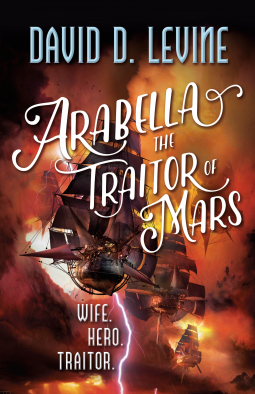
First I must offer an explanation of why it took me so long to review this book, which entails a bit of background. I was introduced to the work of David D. Levine through his science fiction short stories, which by the way are awesome and utterly award-worthy. I loved the concept of the first “Arabella” book, Arabella of Mars. Intrepid heroine/coming of age! Steampunk airships travel between planets! Adventures on Mars! What more could I want? Oh yes, a bit of stowawaying and a touch of romance. I loved that first book.
Alas, when I picked up Arabella the Traitor of Mars, I did not realize there was a middle book (Arabella and the Battle of Venus). I started reading Traitor but quickly (as on the first page) realized that much, too much had happened. Who are these other people and why does Arabella have a prosthetic foot? I set it aside, thinking to pick up the middle book at some vaguely future time and then return. In the way of things, that future time kept stretching further and further away.
Then, as fate would have it, I heard Levine read the opening chapter at a convention, FogCon to be exact. First of all, Levine is an amazing reader, expressive and elegant, perfectly conveying the mildly Victorian steampunk flavor of the narrative. Two sentences in, I was captivated. Ignorance of the middle book evaporated into insignificance. So I returned to Traitor, now perfectly willing to let the story carry me along in trust that all would be made clear from context. And it was.
The Victorian sensibilities of steampunk play out in a parallel to English imperialism, with striking echoes of the occupation of India and the Opium Wars in China. Arabella remains true to her Martian roots, loyal to her principles and her alien friends, and courageous enough to leave her dearly loved husband to warn Mars of the impending assault. The chase sequence is one of the best, most dramatically perfect, I’ve ever read, worthy of the best of Patrick O’Brien or C.S. Forester. And the rest of the book is just as good. The series is highly recommended.
The usual disclaimer: I received a review copy of this book, but no one bribed me to say anything in particular about it. Although chocolates and fine imported tea are always welcome.

Published on June 07, 2019 01:00
June 3, 2019
May Was Convention Month for Deborah
I don’t attend many conventions, and most of the ones I do appear at are local. The last
 Mass autographing, Nebula weekendcouple of years have presented me with more opportunities. Some have involved a bit of driving and staying either with a friend or in the convention hotel. This year began with one such, FogCon in March. I’d enjoyed last year’s so much, I found a friend to share the hotel room with.
Mass autographing, Nebula weekendcouple of years have presented me with more opportunities. Some have involved a bit of driving and staying either with a friend or in the convention hotel. This year began with one such, FogCon in March. I’d enjoyed last year’s so much, I found a friend to share the hotel room with.
Usually it takes me a while to settle back into my usual schedule after a convention. For one thing, I normally move more slowly through my days, and conversations with family and close friends, while often rich in ideas, are more slowly paced, with lots of pauses to listen deeply and reflect on what has just been said. So I need to “revv up” the pace for conventions and then “spin down” afterward.
This year was not going to cooperate with that principle. I got a good long rest after FogCon, but then back to back conventions in May.
The first was the SFWA Nebula Awards Weekend, which is held in different parts of the country. I try to attend whenever it’s on my coast. Unlike other conventions, where I put on my “pro writer speaking to fans” hat, the Nebs are for professional writers and editors. Not a costume in sight, unless you count the elegant garb worn at the awards banquet itself. The panels are uniformly excellent, plus it’s a chance to see friends and colleagues from far away. This year, the Nebs involved a day-long drive. Originally I wasn’t going to attend, but inspiration struck — in the form of the same friend I shared the room with at FogCon, Juliette Wade. I already knew we got along really well, so it seemed reasonable to drive down together.
Juliette had been scheduled to moderate a panel on “The Gentle Art of Cursing,” but the time was late on the last day, which would have meant either staying an extra night (and she has school aged children) or driving all night. Fortunately, the programming folks were able to not only reschedule it (to the night we arrived) but add me. So, a few notes on cursing in world-building:
“Cursing” can mean use of an intensifier (“not f--ing likely”), an expression of dismay (“#$%^&*(!!!”), an insult (“you m--f--er!”), or a ritual to invoke harm upon another. In English, we tend to use the same words for the first three, and frown upon the fourth as dark magic. Obscenities typically involve reference to bodily functions or religion. Certain words sound like “cuss words.” We tried out some invented words and found that some worked better than others. I sang “frell” as if it were operatic Italian.
I made it to the last half of the panel on Managing a Creative Career with a Mental Illness, and wish I’d gotten there sooner. Here are my notes, wonderfully insightful concepts we can all use, whether we have a diagnosis or not:
“I have brain measles.”“I am having symptoms.”Practicing saying, “Thank you, I appreciate that,” when receiving praise. Give more compliments to others.Get support from others who’ve been there. Strive for good brain health. Get enough rest.Allow yourself to have down/off/rest days/times.Remember that you have been through an episode like this before. You have written, and you will write again. This too shall pass.Crazy VR (virtual reality) doesn’t resolve just because you recognize it for what it is. You still have to live with it.If you’re having a down day, let people know, especially if it involves deadlines and other commitments.
Another of the “money shot” quotes came from David D. Levine, when describing how to make an effective pitch: don’t impose a cognitive burden on your listener; make it easy to grasp the concept.
Saturday morning, I got up and exercised, then noodled around the “hospitality space” that SFWA set up, adjacent to the coffee shop. The yoga class was about to start, so I joined in. It was held outdoors, which meant wearing shoes, but I thoroughly enjoyed it, and found the physical relaxation and mental refreshment quite wonderful.
Saturday evening was the awards banquet and ceremony, wonderful as always. This is a time the professional community comes together to celebrate the achievements of its luminaries.
BayCon: Originally I didn’t have any panels on Saturday, but I got added to “Whatever
 At BayCon 2019Happened to FFW?” FFW was an old term of opprobrium for Female Fantasy Writers. Women have always written fantasy, even before J.R.R. Tolkien’s The Lord of the Rings made fantasy a Thing. C. L. Moore, Leigh Brackett, and Andre Norton (to name only a few — sorry if I omitted your favorite FFW) were followed by Ursula K. LeGuin, Anne McCaffrey, and our very own moderator, Katharine Kerr. Some names are still familiar, some women are still writing, but less visibly. Others have either stopped writing or been forgotten.
At BayCon 2019Happened to FFW?” FFW was an old term of opprobrium for Female Fantasy Writers. Women have always written fantasy, even before J.R.R. Tolkien’s The Lord of the Rings made fantasy a Thing. C. L. Moore, Leigh Brackett, and Andre Norton (to name only a few — sorry if I omitted your favorite FFW) were followed by Ursula K. LeGuin, Anne McCaffrey, and our very own moderator, Katharine Kerr. Some names are still familiar, some women are still writing, but less visibly. Others have either stopped writing or been forgotten.
Much of the discussion of women writers and women characters continued the next day with “How to Write a Heroine.” My own preference is to say woman or female hero, not heroine, because the gendered noun implies diminutive (like “authoress”). We talked about the difference between narrator, protagonist, and hero, and what constitutes heroism, and whether female heroes solve problems differently than male heroes do. I found myself thinking of Precious Ramotswe, the hero of The Ladies No. One Detective Agency books by Alexander McCall Smith, and what makes her a hero to me is her steadfast belief in her own resourcefulness.
Monday’s Urban Legends in Science was a hoot. We covered everything from chemtrails to the outright fraud on the part of Andrew Wakefield that spawned todays anti-vaxxers, nutrition, the paranormal, and how often the laws of physics are violated in film. One panelist recommended Committee for Skeptical Inquiry (CSI), formerly known as the Committee for the Scientific Investigation of Claims of the Paranormal (CSICOP), as a resource.
My last panel, “By Any Other Name” addressed the challenge of coming up with titles, as well as personal and place names. The three of us panelists — Heather Rose Jones, Maya Kaathryn Bohnhoff, and I — all had different approaches to naming people and sometimes places, but we all considered culture and language as integral parts of linguistic world-building.
In between events at both conventions, I had many wonderful, warm, and substantial conversations with colleagues and dear friends. I said hello to others, got to know a few of them better, and introduced myself to authors whose work I loved. I won’t list names; to me, that’s too much like name-dropping, and relationships are not, imho, suitable fodder for public discourse. But in the end, it was these rich discussions and deepening friendships that make such gatherings memorable.
You don’t have to be an author to make friends with those whose work you enjoy. Just walk up and say hello, maybe ask a few questions. Offer to buy the author a cup of coffee. Better yet, as for an autograph or even better than better yet, mention the review of their work you’ve just posted. We all love great stories, both the tellers and the listeners, and those places switch all the time. In the years I’ve been going to conventions, I’ve seen fans, writers, editors, and publishers all switch places. So be polite. Be appreciative. Be kind. Be joyful!
Photo credits: Nebula shot by Dave Smeds; BayCon shot by David Price.
 Mass autographing, Nebula weekendcouple of years have presented me with more opportunities. Some have involved a bit of driving and staying either with a friend or in the convention hotel. This year began with one such, FogCon in March. I’d enjoyed last year’s so much, I found a friend to share the hotel room with.
Mass autographing, Nebula weekendcouple of years have presented me with more opportunities. Some have involved a bit of driving and staying either with a friend or in the convention hotel. This year began with one such, FogCon in March. I’d enjoyed last year’s so much, I found a friend to share the hotel room with.Usually it takes me a while to settle back into my usual schedule after a convention. For one thing, I normally move more slowly through my days, and conversations with family and close friends, while often rich in ideas, are more slowly paced, with lots of pauses to listen deeply and reflect on what has just been said. So I need to “revv up” the pace for conventions and then “spin down” afterward.
This year was not going to cooperate with that principle. I got a good long rest after FogCon, but then back to back conventions in May.
The first was the SFWA Nebula Awards Weekend, which is held in different parts of the country. I try to attend whenever it’s on my coast. Unlike other conventions, where I put on my “pro writer speaking to fans” hat, the Nebs are for professional writers and editors. Not a costume in sight, unless you count the elegant garb worn at the awards banquet itself. The panels are uniformly excellent, plus it’s a chance to see friends and colleagues from far away. This year, the Nebs involved a day-long drive. Originally I wasn’t going to attend, but inspiration struck — in the form of the same friend I shared the room with at FogCon, Juliette Wade. I already knew we got along really well, so it seemed reasonable to drive down together.
Juliette had been scheduled to moderate a panel on “The Gentle Art of Cursing,” but the time was late on the last day, which would have meant either staying an extra night (and she has school aged children) or driving all night. Fortunately, the programming folks were able to not only reschedule it (to the night we arrived) but add me. So, a few notes on cursing in world-building:
“Cursing” can mean use of an intensifier (“not f--ing likely”), an expression of dismay (“#$%^&*(!!!”), an insult (“you m--f--er!”), or a ritual to invoke harm upon another. In English, we tend to use the same words for the first three, and frown upon the fourth as dark magic. Obscenities typically involve reference to bodily functions or religion. Certain words sound like “cuss words.” We tried out some invented words and found that some worked better than others. I sang “frell” as if it were operatic Italian.
I made it to the last half of the panel on Managing a Creative Career with a Mental Illness, and wish I’d gotten there sooner. Here are my notes, wonderfully insightful concepts we can all use, whether we have a diagnosis or not:
“I have brain measles.”“I am having symptoms.”Practicing saying, “Thank you, I appreciate that,” when receiving praise. Give more compliments to others.Get support from others who’ve been there. Strive for good brain health. Get enough rest.Allow yourself to have down/off/rest days/times.Remember that you have been through an episode like this before. You have written, and you will write again. This too shall pass.Crazy VR (virtual reality) doesn’t resolve just because you recognize it for what it is. You still have to live with it.If you’re having a down day, let people know, especially if it involves deadlines and other commitments.
Another of the “money shot” quotes came from David D. Levine, when describing how to make an effective pitch: don’t impose a cognitive burden on your listener; make it easy to grasp the concept.
Saturday morning, I got up and exercised, then noodled around the “hospitality space” that SFWA set up, adjacent to the coffee shop. The yoga class was about to start, so I joined in. It was held outdoors, which meant wearing shoes, but I thoroughly enjoyed it, and found the physical relaxation and mental refreshment quite wonderful.
Saturday evening was the awards banquet and ceremony, wonderful as always. This is a time the professional community comes together to celebrate the achievements of its luminaries.
BayCon: Originally I didn’t have any panels on Saturday, but I got added to “Whatever
 At BayCon 2019Happened to FFW?” FFW was an old term of opprobrium for Female Fantasy Writers. Women have always written fantasy, even before J.R.R. Tolkien’s The Lord of the Rings made fantasy a Thing. C. L. Moore, Leigh Brackett, and Andre Norton (to name only a few — sorry if I omitted your favorite FFW) were followed by Ursula K. LeGuin, Anne McCaffrey, and our very own moderator, Katharine Kerr. Some names are still familiar, some women are still writing, but less visibly. Others have either stopped writing or been forgotten.
At BayCon 2019Happened to FFW?” FFW was an old term of opprobrium for Female Fantasy Writers. Women have always written fantasy, even before J.R.R. Tolkien’s The Lord of the Rings made fantasy a Thing. C. L. Moore, Leigh Brackett, and Andre Norton (to name only a few — sorry if I omitted your favorite FFW) were followed by Ursula K. LeGuin, Anne McCaffrey, and our very own moderator, Katharine Kerr. Some names are still familiar, some women are still writing, but less visibly. Others have either stopped writing or been forgotten.Much of the discussion of women writers and women characters continued the next day with “How to Write a Heroine.” My own preference is to say woman or female hero, not heroine, because the gendered noun implies diminutive (like “authoress”). We talked about the difference between narrator, protagonist, and hero, and what constitutes heroism, and whether female heroes solve problems differently than male heroes do. I found myself thinking of Precious Ramotswe, the hero of The Ladies No. One Detective Agency books by Alexander McCall Smith, and what makes her a hero to me is her steadfast belief in her own resourcefulness.
Monday’s Urban Legends in Science was a hoot. We covered everything from chemtrails to the outright fraud on the part of Andrew Wakefield that spawned todays anti-vaxxers, nutrition, the paranormal, and how often the laws of physics are violated in film. One panelist recommended Committee for Skeptical Inquiry (CSI), formerly known as the Committee for the Scientific Investigation of Claims of the Paranormal (CSICOP), as a resource.
My last panel, “By Any Other Name” addressed the challenge of coming up with titles, as well as personal and place names. The three of us panelists — Heather Rose Jones, Maya Kaathryn Bohnhoff, and I — all had different approaches to naming people and sometimes places, but we all considered culture and language as integral parts of linguistic world-building.
In between events at both conventions, I had many wonderful, warm, and substantial conversations with colleagues and dear friends. I said hello to others, got to know a few of them better, and introduced myself to authors whose work I loved. I won’t list names; to me, that’s too much like name-dropping, and relationships are not, imho, suitable fodder for public discourse. But in the end, it was these rich discussions and deepening friendships that make such gatherings memorable.
You don’t have to be an author to make friends with those whose work you enjoy. Just walk up and say hello, maybe ask a few questions. Offer to buy the author a cup of coffee. Better yet, as for an autograph or even better than better yet, mention the review of their work you’ve just posted. We all love great stories, both the tellers and the listeners, and those places switch all the time. In the years I’ve been going to conventions, I’ve seen fans, writers, editors, and publishers all switch places. So be polite. Be appreciative. Be kind. Be joyful!
Photo credits: Nebula shot by Dave Smeds; BayCon shot by David Price.

Published on June 03, 2019 11:45
May 31, 2019
Short Book Reviews: Greek Gods Teach the Classics
By Jove, by Marissa Doyle (Entangled Pub. and Book View Café)

I picked up this romance set in a university Classics (Greek, Latin) department, hoping for a light-hearted love story, probably involving one or more Greek gods in disguise, and found much more. At first, it read like standard fare, romantic, occasionally humorous with a game of figuring out which professor was which god (and wondering why our heroine, Theodora Fairchild, who is supposedly well versed in the Classics, didn’t have a clue). But the story took a turn into satisfying depths as Theo and Grant Proctor begin courting, and she steps into the role of teacher – not just about romance but about the rich panoply of emotions that make up being human. He grows, but so does she, in the very process of verbalizing and practicing the dance of relationships. I won’t tell you which mythological character he is, since half the fun was figuring it out. Suffice it to say that he is very far from the all-powerful, perfect lover one might expect.
All is not sweetness and light at Waldrop University, for the charismatic, autocratic chair of the Classics Languages department, Julian d’Amboise, has his own agenda, and his own aeons-long grudge against Grant. When he sets his manipulative, coercive sights on Theo, it’s as much to cause Grant anguish as to win Theo herself.
I loved how Theo battles her way out of Julian’s clutches, rescuing not only herself but Grant. She makes mistakes, but she owns up to them and takes responsibility for making things right. The emphasis on the importance of mutual, respectful consent added to the emotional depth and maturity to the story. Julian uses magical potions to strip Theo of her will, while both Theo and Grant check in with one another. Too often, romance tropes involve force overcoming resistance, and we need better role models. Verdict: A fast, enjoyable read that rises about clichés about damsels in distress.

Published on May 31, 2019 01:00
May 29, 2019
Today's Moment of Art
Published on May 29, 2019 01:00
May 28, 2019
[ARCHIVES] Guest blog: Chaz Brenchley Steampunks Mars (With Added Hockey Sticks)
Chaz Brenchley is an amazing writer -- I've been an unabashed fan ever since I read Bridge of Dreams, which led me to write to him, begging for a story for my editorial debut, Lace and Blade. (That story, "In the Night Street Baths," was reprinted in Wild Stories 2009.) Now, many literary adventures later, Chaz sets his sights on Mars, complete with steampunk and a girl's boarding school placed in a failed hotel that was once a Norman castle. Read on for the delicious details...
One of the joys of living in the heart of Silicon Valley is that NASA Ames is just over there, and SETI HQ is even closer. We live among the cool kids - and the cool kids like to share. I went to NASA for the recent transit of Venus; and ever since I moved here, I’ve been going to SETI’s weekly colloquium where planetary scientists and cosmologists talk about the latest discoveries, or the specific projects they have on a new mission, or the latest weird theory that’s almost a guaranteed Nobel prize if it should ever prove true (“but right now there are only two people who believe it, and they’re both in this room”), and like that.So there I was with planetary scientists at my fingers’ ends for the asking, and lots of Mars talk going on around the time of Curiosity’s landing, so it’s really no wonder that I started thinking about Mars fiction. Real Mars, not so much, for it is dry and inhospitable and I have written my desert books already - but old Mars, Mars with canals and an atmosphere and aliens? Oh, yes. Very much yes.And very much within that spirit, I wanted to steampunk it up a bit; and there was a lot of talk at that time in my social media about how steampunk tended to assume British Empire overtones, as though that were the only choice, and how it so very much was not. So I thought somewhat about that - but I did keep coming back to the British Empire, because I am far from home and the more time I spend in California the more inveterately Brit I become, and because I am the son of an Empire brat (Grandad was a major in the Scots Guards; Mum was born in Rangoon and grew up in Kuala Lumpur and Singapore, speaking Malay more readily than English), and because above all I was really curious. If Mars were a province of the British Empire, how would that actually work? How could it happen, and what would it mean - to the Empire, and to European and world history? And to Mars, and to the presumptive Martians? How do you impose colonial rule on a race that has no concept of empire, or statehood, or governance? And does it make a difference if you’re there by their courtesy, via their aetherships, for reasons you still don’t understand? And how do you negotiate even the broadest heads of agreement where you can barely communicate at all? [image error]And, and, and. This is one way that fiction happens, with a whole slew of questions that need answering. So this last couple of years, I have been writing stories that seek to do that. The first of them, “The Burial of Sir John Mawe at Cassini”, was published in Subterranean and picked up by Gardner Dozois for his Year’s Best SF anthology; the second - “The Astrakhan, the Homburg and the Red Red Coal” - appeared this year in Lightspeed’s “Queers Destroy SF” special issue (Oscar Wilde on Mars!). And I’m working on T E Lawrence on Mars, and A E Housman on Mars, and I’m irretrievably bogged down in a novel about Kipling on Mars (for many of these stories begin with “Y’know, if Mars were a province of the British Empire, [X] would so have gone there...”).So there’s that, and I am passionate about it, beguiled by it, almost obsessed with it.
closer. We live among the cool kids - and the cool kids like to share. I went to NASA for the recent transit of Venus; and ever since I moved here, I’ve been going to SETI’s weekly colloquium where planetary scientists and cosmologists talk about the latest discoveries, or the specific projects they have on a new mission, or the latest weird theory that’s almost a guaranteed Nobel prize if it should ever prove true (“but right now there are only two people who believe it, and they’re both in this room”), and like that.So there I was with planetary scientists at my fingers’ ends for the asking, and lots of Mars talk going on around the time of Curiosity’s landing, so it’s really no wonder that I started thinking about Mars fiction. Real Mars, not so much, for it is dry and inhospitable and I have written my desert books already - but old Mars, Mars with canals and an atmosphere and aliens? Oh, yes. Very much yes.And very much within that spirit, I wanted to steampunk it up a bit; and there was a lot of talk at that time in my social media about how steampunk tended to assume British Empire overtones, as though that were the only choice, and how it so very much was not. So I thought somewhat about that - but I did keep coming back to the British Empire, because I am far from home and the more time I spend in California the more inveterately Brit I become, and because I am the son of an Empire brat (Grandad was a major in the Scots Guards; Mum was born in Rangoon and grew up in Kuala Lumpur and Singapore, speaking Malay more readily than English), and because above all I was really curious. If Mars were a province of the British Empire, how would that actually work? How could it happen, and what would it mean - to the Empire, and to European and world history? And to Mars, and to the presumptive Martians? How do you impose colonial rule on a race that has no concept of empire, or statehood, or governance? And does it make a difference if you’re there by their courtesy, via their aetherships, for reasons you still don’t understand? And how do you negotiate even the broadest heads of agreement where you can barely communicate at all? [image error]And, and, and. This is one way that fiction happens, with a whole slew of questions that need answering. So this last couple of years, I have been writing stories that seek to do that. The first of them, “The Burial of Sir John Mawe at Cassini”, was published in Subterranean and picked up by Gardner Dozois for his Year’s Best SF anthology; the second - “The Astrakhan, the Homburg and the Red Red Coal” - appeared this year in Lightspeed’s “Queers Destroy SF” special issue (Oscar Wilde on Mars!). And I’m working on T E Lawrence on Mars, and A E Housman on Mars, and I’m irretrievably bogged down in a novel about Kipling on Mars (for many of these stories begin with “Y’know, if Mars were a province of the British Empire, [X] would so have gone there...”).So there’s that, and I am passionate about it, beguiled by it, almost obsessed with it.
 But I have other passions too, lifelong passions - and one of those is the Chalet School series by Elinor M Brent-Dyer. Sixty books, written over forty-five years: the tale of an English boarding school established in the Austrian Tyrol, with all that that implies. Mischief at midnight, practical jokes and punishments, prefects and dormitories and matrons and mistresses; but also adventures on a much greater scale, for these books were written in real time through the war and the girls witness anti-Semitic cruelty and take a stand against it and have to flee the Nazis themselves. And retreat first to Guernsey, which turns out not to have been such a good idea, and then to Wales; and spies come after them, and the makeshift migratory wartime school yields some of the best stories in the series. And then after the war the school moves to Switzerland (for it needs to stay close to the TB sanatorium that brings in many of its pupils, and staff too - and that supplies another constant theme to the series, loss and survival and the comforts of faith), and things go on much as before until the author’s death in 1970.These books have a cult following, including some surprising names that I shall not bandy here. And just a few weeks ago, I was walking home from the farmers’ market when I suddenly thought, “Y’know, if Mars were a province of the British Empire, the Chalet School would so have a sister foundation there...”It’s already established in the canon that boys are sent home to the great boarding-schools of England; but aethership journeys are expensive, and space is at a premium. Of course they’d want to educate their girls locally, oh yes...And so the Crater School was born, in a failed hotel built as a Norman castle, on the rim of a crater lake inhabited by a Martian naiad. Just across the water from a sanatorium, for Mars comes of course with its own diseases; and there are Basque shepherds on the slopes and Dutch families on the canal below, Indians and Chinese in the great port cities, and and and...And I’ve stitched all this together into a Patreon project, and we are going to have so much fun, it ought to be illegal. Or at least see us sent to the Headmistress on report. You can read the first two chapters for free here, and the Patreon page is here, if you’d like to support the Crater School for this term and beyond...And by the way, the stories sent out to subscribers as part of the Patreon project will eventually be published all in one place in a Book View Cafe edition.
But I have other passions too, lifelong passions - and one of those is the Chalet School series by Elinor M Brent-Dyer. Sixty books, written over forty-five years: the tale of an English boarding school established in the Austrian Tyrol, with all that that implies. Mischief at midnight, practical jokes and punishments, prefects and dormitories and matrons and mistresses; but also adventures on a much greater scale, for these books were written in real time through the war and the girls witness anti-Semitic cruelty and take a stand against it and have to flee the Nazis themselves. And retreat first to Guernsey, which turns out not to have been such a good idea, and then to Wales; and spies come after them, and the makeshift migratory wartime school yields some of the best stories in the series. And then after the war the school moves to Switzerland (for it needs to stay close to the TB sanatorium that brings in many of its pupils, and staff too - and that supplies another constant theme to the series, loss and survival and the comforts of faith), and things go on much as before until the author’s death in 1970.These books have a cult following, including some surprising names that I shall not bandy here. And just a few weeks ago, I was walking home from the farmers’ market when I suddenly thought, “Y’know, if Mars were a province of the British Empire, the Chalet School would so have a sister foundation there...”It’s already established in the canon that boys are sent home to the great boarding-schools of England; but aethership journeys are expensive, and space is at a premium. Of course they’d want to educate their girls locally, oh yes...And so the Crater School was born, in a failed hotel built as a Norman castle, on the rim of a crater lake inhabited by a Martian naiad. Just across the water from a sanatorium, for Mars comes of course with its own diseases; and there are Basque shepherds on the slopes and Dutch families on the canal below, Indians and Chinese in the great port cities, and and and...And I’ve stitched all this together into a Patreon project, and we are going to have so much fun, it ought to be illegal. Or at least see us sent to the Headmistress on report. You can read the first two chapters for free here, and the Patreon page is here, if you’d like to support the Crater School for this term and beyond...And by the way, the stories sent out to subscribers as part of the Patreon project will eventually be published all in one place in a Book View Cafe edition.
One of the joys of living in the heart of Silicon Valley is that NASA Ames is just over there, and SETI HQ is even
 closer. We live among the cool kids - and the cool kids like to share. I went to NASA for the recent transit of Venus; and ever since I moved here, I’ve been going to SETI’s weekly colloquium where planetary scientists and cosmologists talk about the latest discoveries, or the specific projects they have on a new mission, or the latest weird theory that’s almost a guaranteed Nobel prize if it should ever prove true (“but right now there are only two people who believe it, and they’re both in this room”), and like that.So there I was with planetary scientists at my fingers’ ends for the asking, and lots of Mars talk going on around the time of Curiosity’s landing, so it’s really no wonder that I started thinking about Mars fiction. Real Mars, not so much, for it is dry and inhospitable and I have written my desert books already - but old Mars, Mars with canals and an atmosphere and aliens? Oh, yes. Very much yes.And very much within that spirit, I wanted to steampunk it up a bit; and there was a lot of talk at that time in my social media about how steampunk tended to assume British Empire overtones, as though that were the only choice, and how it so very much was not. So I thought somewhat about that - but I did keep coming back to the British Empire, because I am far from home and the more time I spend in California the more inveterately Brit I become, and because I am the son of an Empire brat (Grandad was a major in the Scots Guards; Mum was born in Rangoon and grew up in Kuala Lumpur and Singapore, speaking Malay more readily than English), and because above all I was really curious. If Mars were a province of the British Empire, how would that actually work? How could it happen, and what would it mean - to the Empire, and to European and world history? And to Mars, and to the presumptive Martians? How do you impose colonial rule on a race that has no concept of empire, or statehood, or governance? And does it make a difference if you’re there by their courtesy, via their aetherships, for reasons you still don’t understand? And how do you negotiate even the broadest heads of agreement where you can barely communicate at all? [image error]And, and, and. This is one way that fiction happens, with a whole slew of questions that need answering. So this last couple of years, I have been writing stories that seek to do that. The first of them, “The Burial of Sir John Mawe at Cassini”, was published in Subterranean and picked up by Gardner Dozois for his Year’s Best SF anthology; the second - “The Astrakhan, the Homburg and the Red Red Coal” - appeared this year in Lightspeed’s “Queers Destroy SF” special issue (Oscar Wilde on Mars!). And I’m working on T E Lawrence on Mars, and A E Housman on Mars, and I’m irretrievably bogged down in a novel about Kipling on Mars (for many of these stories begin with “Y’know, if Mars were a province of the British Empire, [X] would so have gone there...”).So there’s that, and I am passionate about it, beguiled by it, almost obsessed with it.
closer. We live among the cool kids - and the cool kids like to share. I went to NASA for the recent transit of Venus; and ever since I moved here, I’ve been going to SETI’s weekly colloquium where planetary scientists and cosmologists talk about the latest discoveries, or the specific projects they have on a new mission, or the latest weird theory that’s almost a guaranteed Nobel prize if it should ever prove true (“but right now there are only two people who believe it, and they’re both in this room”), and like that.So there I was with planetary scientists at my fingers’ ends for the asking, and lots of Mars talk going on around the time of Curiosity’s landing, so it’s really no wonder that I started thinking about Mars fiction. Real Mars, not so much, for it is dry and inhospitable and I have written my desert books already - but old Mars, Mars with canals and an atmosphere and aliens? Oh, yes. Very much yes.And very much within that spirit, I wanted to steampunk it up a bit; and there was a lot of talk at that time in my social media about how steampunk tended to assume British Empire overtones, as though that were the only choice, and how it so very much was not. So I thought somewhat about that - but I did keep coming back to the British Empire, because I am far from home and the more time I spend in California the more inveterately Brit I become, and because I am the son of an Empire brat (Grandad was a major in the Scots Guards; Mum was born in Rangoon and grew up in Kuala Lumpur and Singapore, speaking Malay more readily than English), and because above all I was really curious. If Mars were a province of the British Empire, how would that actually work? How could it happen, and what would it mean - to the Empire, and to European and world history? And to Mars, and to the presumptive Martians? How do you impose colonial rule on a race that has no concept of empire, or statehood, or governance? And does it make a difference if you’re there by their courtesy, via their aetherships, for reasons you still don’t understand? And how do you negotiate even the broadest heads of agreement where you can barely communicate at all? [image error]And, and, and. This is one way that fiction happens, with a whole slew of questions that need answering. So this last couple of years, I have been writing stories that seek to do that. The first of them, “The Burial of Sir John Mawe at Cassini”, was published in Subterranean and picked up by Gardner Dozois for his Year’s Best SF anthology; the second - “The Astrakhan, the Homburg and the Red Red Coal” - appeared this year in Lightspeed’s “Queers Destroy SF” special issue (Oscar Wilde on Mars!). And I’m working on T E Lawrence on Mars, and A E Housman on Mars, and I’m irretrievably bogged down in a novel about Kipling on Mars (for many of these stories begin with “Y’know, if Mars were a province of the British Empire, [X] would so have gone there...”).So there’s that, and I am passionate about it, beguiled by it, almost obsessed with it.
 But I have other passions too, lifelong passions - and one of those is the Chalet School series by Elinor M Brent-Dyer. Sixty books, written over forty-five years: the tale of an English boarding school established in the Austrian Tyrol, with all that that implies. Mischief at midnight, practical jokes and punishments, prefects and dormitories and matrons and mistresses; but also adventures on a much greater scale, for these books were written in real time through the war and the girls witness anti-Semitic cruelty and take a stand against it and have to flee the Nazis themselves. And retreat first to Guernsey, which turns out not to have been such a good idea, and then to Wales; and spies come after them, and the makeshift migratory wartime school yields some of the best stories in the series. And then after the war the school moves to Switzerland (for it needs to stay close to the TB sanatorium that brings in many of its pupils, and staff too - and that supplies another constant theme to the series, loss and survival and the comforts of faith), and things go on much as before until the author’s death in 1970.These books have a cult following, including some surprising names that I shall not bandy here. And just a few weeks ago, I was walking home from the farmers’ market when I suddenly thought, “Y’know, if Mars were a province of the British Empire, the Chalet School would so have a sister foundation there...”It’s already established in the canon that boys are sent home to the great boarding-schools of England; but aethership journeys are expensive, and space is at a premium. Of course they’d want to educate their girls locally, oh yes...And so the Crater School was born, in a failed hotel built as a Norman castle, on the rim of a crater lake inhabited by a Martian naiad. Just across the water from a sanatorium, for Mars comes of course with its own diseases; and there are Basque shepherds on the slopes and Dutch families on the canal below, Indians and Chinese in the great port cities, and and and...And I’ve stitched all this together into a Patreon project, and we are going to have so much fun, it ought to be illegal. Or at least see us sent to the Headmistress on report. You can read the first two chapters for free here, and the Patreon page is here, if you’d like to support the Crater School for this term and beyond...And by the way, the stories sent out to subscribers as part of the Patreon project will eventually be published all in one place in a Book View Cafe edition.
But I have other passions too, lifelong passions - and one of those is the Chalet School series by Elinor M Brent-Dyer. Sixty books, written over forty-five years: the tale of an English boarding school established in the Austrian Tyrol, with all that that implies. Mischief at midnight, practical jokes and punishments, prefects and dormitories and matrons and mistresses; but also adventures on a much greater scale, for these books were written in real time through the war and the girls witness anti-Semitic cruelty and take a stand against it and have to flee the Nazis themselves. And retreat first to Guernsey, which turns out not to have been such a good idea, and then to Wales; and spies come after them, and the makeshift migratory wartime school yields some of the best stories in the series. And then after the war the school moves to Switzerland (for it needs to stay close to the TB sanatorium that brings in many of its pupils, and staff too - and that supplies another constant theme to the series, loss and survival and the comforts of faith), and things go on much as before until the author’s death in 1970.These books have a cult following, including some surprising names that I shall not bandy here. And just a few weeks ago, I was walking home from the farmers’ market when I suddenly thought, “Y’know, if Mars were a province of the British Empire, the Chalet School would so have a sister foundation there...”It’s already established in the canon that boys are sent home to the great boarding-schools of England; but aethership journeys are expensive, and space is at a premium. Of course they’d want to educate their girls locally, oh yes...And so the Crater School was born, in a failed hotel built as a Norman castle, on the rim of a crater lake inhabited by a Martian naiad. Just across the water from a sanatorium, for Mars comes of course with its own diseases; and there are Basque shepherds on the slopes and Dutch families on the canal below, Indians and Chinese in the great port cities, and and and...And I’ve stitched all this together into a Patreon project, and we are going to have so much fun, it ought to be illegal. Or at least see us sent to the Headmistress on report. You can read the first two chapters for free here, and the Patreon page is here, if you’d like to support the Crater School for this term and beyond...And by the way, the stories sent out to subscribers as part of the Patreon project will eventually be published all in one place in a Book View Cafe edition.
Published on May 28, 2019 13:26
May 24, 2019
Short Book Reviews: Alien Abduction Falls Short
 Glow : Book I, Potency, by Aubrey Hadley (Ruby & Topaz Publishing)
Glow : Book I, Potency, by Aubrey Hadley (Ruby & Topaz Publishing)This book began auspiciously with a homeschooled teenager who loves soccer and rebels against her mother’s demands for a curfew as a mysterious “sleeping syndrome” reaches epidemic scale. Not only that, but she starts seeing mysterious glowing creatures, invisible to everyone else. Before we can catch our collective breath, she’s kidnapped by an alien race bent of cleansing the Earth of human evil. What a great set-up!
Unfortunately, that’s where the story began to sag. The suspense dissipated into long, long, long stretches of characters explaining the obvious to one another. Action submerged under the weight of description and dialog that didn’t advance the plot, reveal character, or heighten conflict. Even when something important was happening, it felt distant and flat, without emotional engagement.
On a prose level, the many scientific impossibilities or rather extreme implausibilities are dismissed with “unknown reason,” or “somehow this happens.” I was able to ignore most of the medical errors, until “Unless he’s bipolar and can change his mind without a trace of his old emotions” just threw me out of the story, since my husband has bipolar disorder and that’s not how it works. Awkward prose includes bits like, “My ears comb the silence,” and “The seconds of silence that followed lingered in the air like a pungent smell.”
I want to say something about first person, present tense, when handled by an inexperienced writer. Both choices give the illusionof dramatic intensity and emotional immediacy but are actually hurdles to achieving them. Just because action happens inside the protagonist’s head and “in the now” does not automatically engage the reader more deeply. First person is commonly used in Young Adult fiction today (although this was not always true and might fall into disfavor in the future) because the focus is so often the personal growth of the central character. This creates difficulties in conveying information that’s necessary for the reader to understand but that the narrator herself does not know or that there is no logical reason for her to think about. You end up with dialog whose only purpose is the edification of the reader, or in which two characters tell each other what they already know, or ask idiotic questions at inappropriate times, which happens entirely too frequently in this book. Present tense in particular requires skill in order to not be flat and passive. You end up with passages of verbal flab like:
We go through the net, the garden, and then come to the base of the structure. There is no visible divide between the inside and outside. We enter the building by walking through an invisible force field. We enter a massive lobby with towering white walls that elegantly slope down from the ceiling and rise up from the floor like white sand dunes. We go to the wall straight ahead.
If you’re in need for a cure for insomnia, look no further. (Snarky aside: three out of four sentences begin with “we,” and two of those “we enter” — what editor let this slip through?)
I think in the end the length and tedious pace bothered me so much because I didn’t connect with the central character. She kept asking annoying rhetorical questions, and the choice of present tense conferred an unfortunate emotional flatness. Another reader might love the book. For me, though, the fact that this is only the first book in a series made it ¾ of a book too long. The story is imaginative and should have been compelling. I don’t know whether the author or the editor bears the greater share of blame for the result.

Published on May 24, 2019 01:00





